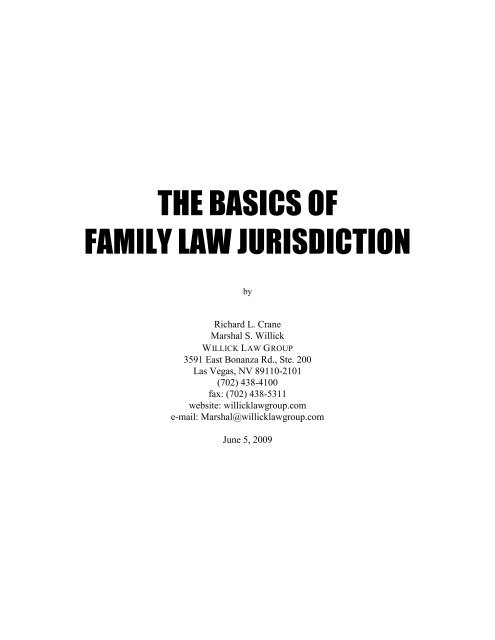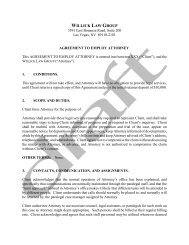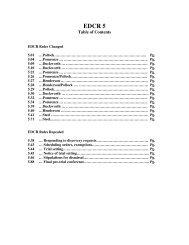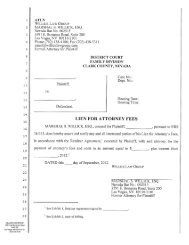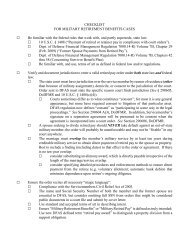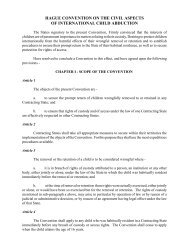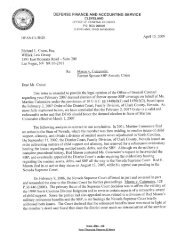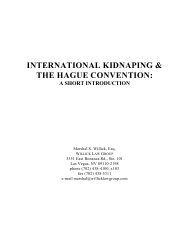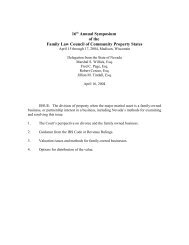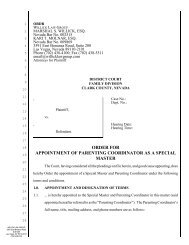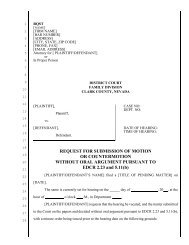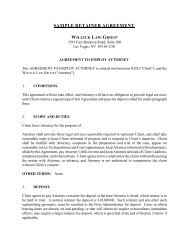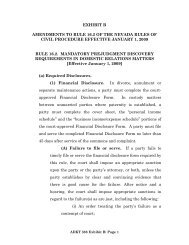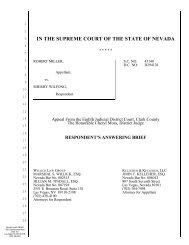THE BASICS OF FAMILY LAW JURISDICTION - Willick Law Group
THE BASICS OF FAMILY LAW JURISDICTION - Willick Law Group
THE BASICS OF FAMILY LAW JURISDICTION - Willick Law Group
Create successful ePaper yourself
Turn your PDF publications into a flip-book with our unique Google optimized e-Paper software.
<strong>THE</strong> <strong>BASICS</strong> <strong>OF</strong><strong>FAMILY</strong> <strong>LAW</strong> <strong>JURISDICTION</strong>byRichard L. CraneMarshal S. <strong>Willick</strong>WILLICK <strong>LAW</strong> GROUP3591 East Bonanza Rd., Ste. 200Las Vegas, NV 89110-2101(702) 438-4100fax: (702) 438-5311website: willicklawgroup.come-mail: Marshal@willicklawgroup.comJune 5, 2009
TABLE <strong>OF</strong> CONTENTSI. <strong>THE</strong> CONCEPT <strong>OF</strong> DIVISIBLE DIVORCE...................................1II.DIVORCE <strong>JURISDICTION</strong>................................................2III. CHILD CUSTODY – INITIAL <strong>JURISDICTION</strong>. . . . . . . . . . . . . . . . . . . . . . . . . . . . . . . . 4IV. CHILD CUSTODY – MODIFICATION <strong>JURISDICTION</strong>.. . . . . . . . . . . . . . . . . . . . . . . . 8V. CHILD SUPPORT – INITIAL <strong>JURISDICTION</strong>.. . . . . . . . . . . . . . . . . . . . . . . . . . . . . . . 10VI. CHILD SUPPORT – MODIFICATION <strong>JURISDICTION</strong>. . . . . . . . . . . . . . . . . . . . . . . . 13VII. DIVISION <strong>OF</strong> MILITARY RETIREMENT BENEFITS AS PROPERTY. . . . . . . . . . . 15VIII. AWARDING FEES WHERE <strong>JURISDICTION</strong> IS CONTESTED. . . . . . . . . . . . . . . . . . 16IX.CONCLUSIONS........................................................17iv
II.DIVORCE <strong>JURISDICTION</strong>Most Nevada litigation as to jurisdiction has involved not the “causes” authorizing suits for divorce,but the requisites for filing a complaint under NRS 125.020. What appears to cause confusion insome quarters is the seeming blurring of tests for subject matter jurisdiction, on the one hand, andpersonal jurisdiction, on the other. They are distinct, but the Nevada divorce statute makes itnecessary for at least one party to be a bona fide resident of this state (which incidentally gives thecourt personal jurisdiction over that person), for the court to have subject matter jurisdiction toentertain a divorce. 6As noted, subject matter jurisdiction over the marriage itself – and therefore, jurisdiction to grant adivorce – is present as long as the court has personal jurisdiction over either of the parties to themarriage. 7When might a court arguably have jurisdiction to entertain a divorce case but nevertheless declineto do so? When another divorce action is pending elsewhere, and the other court has jurisdictionover a greater number of the incidents of marriage. For example, where a party comes to Nevadaand files for divorce, but the other party does not appear here, but initiates a divorce action in theState from which the party came, and that State has jurisdiction over issues of child custody, childand spousal support, and the bulk of the parties’ property.8The rationales are the doctrines of comity and abstention, and the Nevada Supreme Court’s repeated9admonitions against bifurcating divorce actions. Where actions are pending in courts of different10states, whether to stay or dismiss one action or the other should be raised by motion. A ruling onwhether to stay or dismiss must take into consideration matters outside the pleadings, such as theseriousness of the threat of multiple and vexatious litigation, the convenience of the parties, the11status of the foreign actions, and the competing interests of the two forums. Considerations of6See Plunkett v. Plunkett, 71 Nev. 159, 283 P.2d 255 (1955).78Williams v. North Carolina, 317 U.S. 287 (1942).“Comity,” strictly speaking, is a “rule of courtesy by which one court defers to the concomitant jurisdictionof another.” Gifis <strong>Law</strong> Dictionary (Barron’s 1984 ed.) at 79. As the dictionary definition further explains, “judicialcomity is not a rule of law, but one of practical convenience and expediency based on the theory that a court which firstasserts jurisdiction will not be interfered with in the continuance of its assertion by another court . . . unless it is desirablethat one give way to the other.”9See, e.g., Gojack v. District Court, 95 Nev. 443, 596 P.2d 237 (1979); Smith v. Smith, 100 Nev. 610, 691 P.2d428 (1984).1011See, e.g., Marriage of Hanley, 199 Cal. App. 3d 1109 (Ct. App. 1998).Engle v. Superior Court, 140 Cal. App. 2d 71, 82-83 (Ct. App. 1956).-2-
18 19uniform act – the UCCJA – and the technicalities of applying the PKPA, resulted in a loss ofuniformity among the States. The Obstacles Study suggested a number of amendments which wouldeliminate the inconsistent state interpretations and harmonize the UCCJA with the PKPA.20NCCUSL went back to work and in 1997 issued revisions of the jurisdictional aspects of theUCCJA in a new act, the Uniform Child Custody Jurisdiction and Enforcement Act, or UCCJEA.The replacement act was intended to provide clearer standards for which States can exercise originaljurisdiction over a child custody determination, enunciate a standard of continuing jurisdiction forthe first time, and to clarify modification jurisdiction. It also sought to harmonize the law onsimultaneous proceedings, clean hands, and forum non conveniens.Nevada adopted the new act as of October 1, 2003. The revised enactment was intended to eliminateinconsistent state interpretations in several ways, as explained in the preamble to the modifieduniform act:1. Home State priority. The PKPA prioritizes “home State” jurisdiction byrequiring that full faith and credit cannot be given to a child custody determination by aState that exercises initial jurisdiction as a “significant connection State” when there is a“home State.” Initial custody determinations based on “significant connections” are notentitled to PKPA enforcement unless there is no home State. The UCCJA, however,specifically authorizes four independent bases of jurisdiction without prioritization. Underthe UCCJA, a significant connection custody determination may have to be enforced evenif it would be denied enforcement under the PKPA. The UCCJEA prioritizes home statejurisdiction in Section 201.2. Clarification of emergency jurisdiction. There are several problems with thecurrent emergency jurisdiction provision of the UCCJA § 3(a)(3). First, the language of theUCCJA does not specify that emergency jurisdiction may be exercised only to protect thechild on a temporary basis until the court with appropriate jurisdiction issues a permanentorder. Some courts have interpreted the UCCJA language to so provide. Other courts,however, have held that there is no time limit on a custody determination based onemergency jurisdiction. Simultaneous proceedings and conflicting custody orders haveresulted from these different interpretations.18Uniform Child Custody Jurisdiction Act, the prior NRS ch. 125A.19Parental Kidnaping Prevention Act (“PKPA”), 28 U.S.C. § 1738A.20The National Conference of Commissioners on Uniform State <strong>Law</strong>s. Now 116 years old, NCCUSL providesStates with non-partisan draft legislation intended to bring “clarity and stability” – and most especially, consistency –to various areas of the law. Explicitly supportive of the federal system, members of NCCUSL must be lawyers, andinclude lawyer-legislators, attorneys in private practice, State and federal judges, law professors, and legislative staffattorneys, who have been appointed by State governments as well as districts and territories to research, draft andpromote enactment of uniform State laws in areas where uniformity is desirable and practical.-5-
Second, the emergency jurisdiction provisions predated the widespread enactmentof state domestic violence statutes. Those statutes are often invoked to keep one parentaway from the other parent and the children when there is a threat of violence. Whetherthese situations are sufficient to invoke the emergency jurisdiction provision of the UCCJAhas been the subject of some confusion since the emergency jurisdiction provision does notspecifically refer to violence directed against the parent of the child or against a sibling ofthe child.The UCCJEA contains a separate section on emergency jurisdiction at Section 204which addresses these issues.For the purpose of these materials, the messages are short and simple. If there is a Home State, nofurther inquiry about the significance of anyone’s connections with anywhere else has any relevance.Only if there is no Home State are such “significant connection” analyses relevant. 21The test is considerably different from the personal jurisdiction test for divorce – the statute stateson its face that “physical presence of, or personal jurisdiction over, a party or a child is not necessaryor sufficient to make a child custody determination.” 22Those lawyers who insist on arguing personal jurisdiction matters in child custody proceedings – andthose judges who indulge such expositions, as opposed to staying focused on the statutory inquiry– waste the time and money of everyone involved.NRS 125A.305 says that the exclusive potential bases of jurisdiction are a cascade of four choices:1. Nevada is the Home State on the date proceedings were commenced, or wasthe Home State within six months prior to that commencement, and the child is absent,but a parent or person acting as parent continues to live in Nevada.2. Either no other court has jurisdiction as the Home State, or that court hasdeclined to exercise jurisdiction based on its finding that Nevada is the moreappropriate forum based on Nevada being the more “convenient” forum, or based onthe “unjustifiable misconduct” of the party seeking jurisdiction in that other State.Exercising jurisdiction based on this second category requires two additional findings:A. That the child and at least one parent or person acting as a parent havea significant connection with Nevada “other than mere physical presence,” andB. That “substantial evidence” is available in Nevada concerning thechild’s care, protection, training, and personal relationships.21NRS 125A.305.22NRS 125A.305(3).-6-
3. All courts having jurisdiction under those two rules have declined toexercise jurisdiction on the basis that Nevada is the more appropriate forum based onNevada being the more “convenient” forum, or based on the “unjustifiablemisconduct” of the party seeking jurisdiction in the other States.4. No court of any other State would have jurisdiction based on any of theabove three rules.Since statutory law now provides that the above are the “exclusive” bases of jurisdiction for childcustody, traditional long-arm jurisdiction would presumably fail. If the custodial parent and childleave Nevada and move to another State, leaving the non-custodian behind, then Nevada wouldapparently lose jurisdiction to make a child custody award, absent a relinquishment of jurisdictionby a court in that other State.The question is sometimes asked whether these rules are really as clear, and “harsh,” as they seem.For example, what if parents had been separated for more than six months, with the custodial parentand children living elsewhere, and the non-custodial parent living in Nevada, but they agreed thatthey wanted to go through a single, simple joint petition divorce here in Nevada disposing of allissues?It is possible that no one would ever notice. But if either party filed an action in the children’s HomeState claiming that Nevada never had jurisdiction to determine custody, the rule indicates that sucha filing would succeed. 23The bottom line is that the face of the statute requires jurisdiction under its terms for a valid custodyorder to be entered. Under the facts set out above, the parties would be required to either get a childcustody order in the children’s Home State, or obtain an order of the courts of that State decliningto exercise jurisdiction. Absent the latter, the Nevada action should not include child custody.One wrinkle that seems to cause a lot of confusion is the phrase in the Home State provision “or wasthe Home State within six months prior to that commencement.” The easiest way to conceptualizethis rule is by realizing that “There can be only one.” Until and unless a new State is the HomeState, the old Home State continues to be the Home State, and is the place in which custody litigationshould be commenced, if anyone relevant continues to reside there.In the unusual circumstances supporting an assertion of initial emergency jurisdiction (the child ispresent here and has been abandoned or an emergency amounting to actual or threatenedmistreatment or abuse is presented), it is now clear that such an order only lasts until a State withinitial or continuing jurisdiction under NRS 125A.305, 125A.315, and NRS 125A.325, issues anorder relating to the matter.23Obviously, this sketch hypothetical does not deal with all the myriad issues that might be raised, such aswhether the action elsewhere might be found barred by application of judicial estoppel or otherwise. See Vaile v. DistrictCourt, 118 Nev. 262, 44 P.3d 506 (2002) (discussing judicial estoppel doctrine).-7-
Once a court here has made a custody determination, only this court has jurisdiction to modify thatorder, until one of two things happens: Our court determines that neither the child, nor a parent, nor any person acting as a parenthas any significant connection to this State, and that no substantial evidence exists here asto the child’s care, protection, training, and personal relationships;OR A Court of this State, or elsewhere, determines that the child, the child’s parents, and anyperson acting as a parent do not reside here.The comments make it clear that the statutory language is intended to deal with where the peopleinvolved actually live, not with any sense of a technical domicile. Regardless of whether a Stateconsiders a parent a domiciliary, the State loses exclusive, continuing jurisdiction after the child, theparents, and all persons acting as parents have moved from the State.The statutory scheme makes it clear that only the State with CEJ can determine that there is nosignificant connection remaining. So it simply makes no sense for lawyers to continue filing motionsasking our courts to determine that some other State should not exercise its CEJ. The only thing thatcould be asked of our Court is the factual determination that all relevant persons do not reside in theState issuing the earlier order; if any other basis for changing or relinquishing jurisdiction is required,the request must be made in the State issuing the earlier order.If it has been determined that the original State with CEJ lost that jurisdiction, then the questionbecomes whether there is a new Home State, which becomes the place where further custody26litigation should take place. Again, until and unless there is a new Home State, the prior HomeState is presumptively where any custody-related litigation should proceed.It is also necessary to stress that the question of jurisdiction is a “snapshot” taken at the moment offiling the action. In the language of the comments, “jurisdiction attaches at the commencement ofa proceeding.” The way NCCUSL put it: “If State A had jurisdiction under this section at the timea modification proceeding was commenced there, it would not be lost by all parties moving out ofthe State prior to the conclusion of the proceeding. State B would not have jurisdiction to hear amodification unless State A decided that State B was more appropriate under Section 207.” 27What happens to CEJ when parties move out and back depends on whether and when an action isfiled, and who it is that is doing the moving. If all parties leave, but the custodial parent and child26NRS 125A.325.27Our statutes list Section 207 as NRS 125A.365 – “Inconvenient Forum,” which contains the laundry list ofreasons why a State that has jurisdiction might choose not to exercise it. But such questions are beyond the scope of thispaper, which is solely concerned with jurisdiction.-9-
eturn to Nevada (after however long an absence) before some other State makes the requisite finding(that all persons had left) and assumes jurisdiction, then Nevada remains the only place where amodification motion could be filed.But when all relevant persons have left, and the non-custodial parent returns here, there is no sucheffect. Or, as NCCUSL put it: “Exclusive, continuing jurisdiction is not reestablished if, after thechild, the parents, and all persons acting as parents leave the State, the non-custodial parent returns.”So if all parties leave, and the non-custodial parent later returns, the child’s new Home State (or ifthere is none, a significant-connection State) assumes jurisdiction to make custody orders.And yet some judges convene lengthy, costly “evidentiary hearings,” despite those facts being agreedby all parties, to determine “what ought to be done,” when the resolution was a clear matter of lawbased entirely on the absence of jurisdiction.V. CHILD SUPPORT – INITIAL <strong>JURISDICTION</strong>The Uniform Interstate Family Support Act (“UIFSA”) has been adopted in every State. Nevadaadopted it in 1997 as NRS Chapter 130; the additional federally-mandated provisions are containedin NRS chapters 31A, 125B, and 425. Like the UCCJEA did with the federal PKPA, it follows upon a federal enactment with a similar purpose and construction. 28Notably, the rules governing support and custody operate independently of one another. The courtsof this State might be called upon to enforce a child support obligation against someone found here,29or filing here, while having no jurisdiction over custody matters. The obligor parent can always30be sued for child support where that parent lives, because child support is set by the court withpersonal jurisdiction over the paying parent.NCCUSL put significant energy into trying to harmonize the provisions of the UCCJEA with thoseof UIFSA. It is not always possible, given the very different jurisdictional foundations, but theintention is there, which is why so many of the definitional and other provisions read so similarly.Still, distinctions remain.28See 28 U.S.C. § 1738B (1994) (Full Faith and Credit for Child Support Orders Act, or “FFCCSOA”).29See Vaile v. District Court, 118 Nev. 262, 275, 44 P.3d 506, 515 (2002) (“Simply because a court might orderone party to pay child support to another in the exercise of its personal jurisdiction over the parties does not permit thecourt to extend its jurisdiction to the subject matters of child custody and visitation”); see also Kulko v. California, 436U.S. 84, 91-92, 56 L. Ed. 2d 132, 98 S. Ct. 1690 (1978) (where a defendant is subject to a State’s jurisdiction, his rightsin the matters ancillary to divorce may be determined by its courts).30See NRS 130.201(1)-(2); see also, e.g., Prof. John J. Sampson, “UIFSA: Ten Years of Progress in InterstateChild Support Enforcement” (Legal Education Institute National CLE Conference on Family <strong>Law</strong>, Aspen, Colorado,2003) at 184 (Prof. Sampson was the official Reporter for the UIFSA legislation for NCCUSL, which created it).-10-
For example, while the child custody jurisdictional rules are deliberately child-centered, thejurisdictional rules for support initiation are deliberately expansive, and titled “Extended Personal31Jurisdiction.” There are multiple bases for exercise of child support jurisdiction over a non-residentobligor, operating independently and in the alternative: 321. Personal service of summons or other notice of the child support proceeding withinthis State.2. Submission by the obligor to the jurisdiction of this State by consent, by entering ageneral appearance or filing a responsive document having the effect of waiving anycontest to personal jurisdiction.3. Having resided with the child in this State.4. Having resided in this State and providing prenatal expenses or support for the child.5. The child resides in this State by acts or directives of the non-resident.6. The non-resident obligor engaged in sexual intercourse here, and the child may havebeen conceived thereby.7. Any other basis “consistent with the Constitution of this state and the Constitutionof the United States for exercise of personal jurisdiction.”In other words, unlike the situation for custody, it is easy to propose facts under which more than oneState would have initial child support jurisdiction, simultaneously.It is for that reason (among others) that Mr. Vaile submitted himself to the jurisdiction of the courtsof Nevada for the setting of a child support order, even though his divorce Complaint contained afraudulent assertion of residency and Nevada had no jurisdiction over questions of child custody.NRS 130.204 directs the court what to do in the specific circumstance of a “simultaneousproceeding” in two States. The statute has two parts, depending on which State’s case was filed first,and it sounds a bit confusing, because so much of it is framed in the negative, but the rules actuallydo make sense.31See NRS ch. 130, Article 2 (Jurisdiction).32NRS 130.201.-11-
If the Nevada case was filed second, the first part of the statute applies:1. A tribunal of this state may exercise jurisdiction to establish a support order if thepetition or comparable pleading is filed after a petition or comparable pleading isfiled in another state only if:(a)(b)(c)The petition or comparable pleading in this state is filed before theexpiration of the time allowed in the other state for filing a responsivepleading challenging the exercise of jurisdiction by the other state;The contesting party challenges the exercise of jurisdiction in the otherstate in a timely manner; andIf relevant, this state is the home state of the child.If the Nevada case was filed first, the second part of the statute applies:2. A tribunal of this state may not exercise jurisdiction to establish a support order ifthe petition or comparable pleading is filed before a petition or comparable pleadingis filed in another state if:(a)(b)(c)The petition or comparable pleading in the other state is filed before theexpiration of the time allowed in this state for filing a responsive pleadingchallenging the exercise of jurisdiction by this state;The contesting party challenges the exercise of jurisdiction in this state ina timely manner; andIf relevant, the other state is the home state of the child.In other words, where simultaneous child support proceedings are ongoing both here and elsewhere,the first question is which action was filed first. If it was the Nevada case, the action proceeds hereunless the out-of-State party filed the other action within the time to answer or otherwise plead here,the objection to jurisdiction is timely filed here, and the other State is the child’s Home State.If the other State’s action was filed first, the Nevada action proceeds only if the Nevada action wasfiled within the time to answer or otherwise plead in the other State, the objection to jurisdiction istimely filed there, and Nevada is the child’s Home State.Together, these “tie-breaking” rules should be mutually exclusive, so only one State’s action shouldproceed to a child support order.Since UIFSA permits jurisdiction over a nonresident to be established on any basis “consistent withthe Constitution of this state and the Constitution of the United States for the exercise of personal-12-
33 34jurisdiction,” the Nevada long-arm statute would apparently permit a child support case wheneverNevada was the last matrimonial domicile.The uniform acts go a long way toward avoiding a “Catch-22” of an obligor by providing limitedimmunity – a party participating in a UIFSA proceeding has immunity from both accidentalappearance and from service of civil process while litigating the UIFSA proceedings or while35 36physically present to participate in them. A similar provision is included in the UCCJEA, so itshould not be possible to “boot-strap” a child custody case onto a child support case, or vice-versa;rather, it is necessary to have independent jurisdiction under the respective statute to conductproceedings on that subject.VI.CHILD SUPPORT – MODIFICATION <strong>JURISDICTION</strong>The rules for modifying child custody orders, on the one hand, and child support orders, on the other,are radically different. As set out above, when all parties leave the State establishing a custodyorder, the Home State of the child becomes the central inquiry. Not so for a child support case.When all parties have left the State with CEJ over child support, they are both entitled to enforcethe support anywhere they choose to register it. In order to modify it, however, each has preciselythe same burden – to register in and move to amend where the other party (custodian or noncustodian)happens to be living. 37As with the custody statutes, establishment of jurisdiction to modify a child support order is a matter38of a “snapshot” taken at the moment of commencement of proceedings. As stated by the NevadaSupreme Court in 2007, “Jurisdiction to modify a foreign support order is properly determined bythe residence of the parties at the time a motion to modify is filed.” 3933NRS 130.201.34NRS 14.065.35NRS 130.314. The immunity furnished, however, might only apply to a person petitioning for a change insupport (not responding to a petition filed by someone else), since the immunity is phrased as applying to “a petitionerin a proceeding under this chapter.” A potential obligor responding to a petition to establish an original support order,even if not properly brought in that jurisdiction, might have to argue by analogy or reference other authority.3637NRS 125A.265. This immunity provision more clearly covers a “party to a child custody proceeding.”NRS 130.611. If all parties move to Nevada, the courts here may also modify the order. NRS 130.613.38See, e.g., Goddard v. Heintzelman, 875 A.2d 1119 (Pa. Super. 2005); Welsher v. Rager, 491 S.E.2d 661 (N.C.App. 1997); Child Support Enforcement Division of Alaska v. Brenckle, 675 N.E.2d 390 (Alaska 1997).39Smith v. Smith, No. 46036 (Order of Reversal and Remand, Feb. 13, 2007).-13-
Unfortunately, the order so stating was not published, and is therefore not formally citable as40authority, but there is no reason to expect any different ruling the next time the matter goes up onappeal.NCCUSL modified UIFSA in 2001 to clearly provide that for UIFSA, as for the UCCJEA,jurisdiction is determined by the parties’ actual physical residence at the time a motion to modify41 42is filed. The Nevada Legislature adopted those amendments in 2007. Any contrary readingwould be antithetical to the “certainty and predictability” that the provisions are intended to create,contrary to the case law that exists, and lead to interpreting the two statutes differently from oneanother for no valid purpose.Despite this, a number of Nevada attorneys have attempted to manipulate matters by having theirclients flee the State after registration of a child support order and filing of a modification motionhere, and have actually gone into court claiming that the post-commencement relocation of theirclients has an effect on the jurisdiction of the court. Mystifyingly, at least a couple of judges in thisState have actually entertained such arguments, and resolved the question of jurisdiction based onthe post-commencement relocation of the party resisting the support modification.Any such argument, or ruling, is improper. The relocation of any party after filing of a motion tomodify child support is entirely irrelevant to the jurisdiction of the court. No such argument shouldever be made, or entertained.Many of the jurisdictional rules for modification of a child support order are the same as thosediscussed above for initiation of such a case – such as the permissible bases for exercise andapplication of the long-arm statute.And there is authority governing what to do in the circumstance when all parties have left the issuingState, but one of them moves back before any other State assumes jurisdiction to modify the supportorder.The current version of UIFSA § 611, enacted in Nevada as NRS 130.611, in combination with the“snapshot” rule described above, provide that even when both parties have left the original issuingstate, and that State thus loses continuing, exclusive jurisdiction, when one party moves back to that40SCR 123.41In the words of the official comment: “the time to measure whether the issuing tribunal has continuing,exclusive jurisdiction to modify its order, or whether all parties and child have left the State, is explicitly stated to be atthe time of filing a proceeding to modify the child support order.” Any “intent” to change residence at any moment afterthe actual filing of a motion is entirely irrelevant to the analysis.42See NRS 130.205(a) (2007 amendments); SB 77 § 17 (2007 Legislature).-14-
State before any other state has taken continuing, exclusive jurisdiction, then the original issuingState’s continuing, exclusive jurisdiction “springs back” into being. 43The 2001 amendment to UIFSA § 611 changed “remains the residence” to “is the residence” to makeit clear the original intent of the drafters that when a party returns to the original issuing state andnot other state has modified the order, then the original issuing state’s continuing, exclusivejurisdiction is restored. 44An important distinction between the UCCJEA and UIFSA is that the latter does not include anygrounds under which a court can decline jurisdiction over a support case once it has it. UnderUIFSA, a court may not elect to decline jurisdiction to hear the merits of a modification motion once45the jurisdictional basis for proceeding here has been established. At the moment a motion formodification is filed in a court that has UIFSA jurisdiction, the prior State no longer had jurisdiction,and the Nevada courts lack the “privilege of declining jurisdiction.” 46It should also be made clear that once child support has been established in one State, not everyaspect of the support order may later be modified elsewhere. The 2001 amendments made it clearthat the duration of child-support obligation is fixed by the controlling order. 47In other words, the original time frame for support is not modifiable unless the law of the issuingState provides for modification of its duration. If the duration of child support was age 21 in theState from which the original order came, then the age for termination of support is 21 here, even48if everyone has moved to Nevada, where the age is 18 (or 19, if still in high school). The reverse43Special thanks to Laura Morgan, Esq., from whom this description was taken.44See Laura Morgan, UIFSA’s “Spring Back” Provisions of Continuing, Exclusive Jurisdiction (2006), postedat http://www.supportguidelines.com/articles/article200507.html, and citing John J. Sampson and Barry J. Brooks,Uniform Interstate Family Support Act (2001) with Prefatory Notes and Comments (with Still More UnofficialAnnotations, 36 Fam L.Q. 329, 368 (2002).45Specifically, the Official Comments to § 611 (our NRS 130.611) explain:Modification of child support under Subsections (a)(1) and (a)(2) is distinct from custody modificationunder the federal Parental Kidnaping Prevention Act, [28 U.S.C. § 1738A], which provides that thecourt of continuing, exclusive jurisdiction may “decline jurisdiction.” Similar provisions are foundin the UCCJA, Section 14. In those statutes the methodology for the declination of jurisdiction is notspelled out, but rather is left to the discretion of possibly competing courts for case-by-casedetermination. The privilege of declining jurisdiction, thereby creating the potential for a vacuum, isnot authorized under UIFSA, see Rosen v. Lantos, 938 P.2d 729, 734 (N.M. App. 1997).46NRS 130.611 & Official Comments.47See, e.g., Robdau v. Commonwealth, Virginia Dept. Social Serv., 543 S.E.2d 602 (Va. App. 2001).48NRS 130.611(3); NRS 130.613. And the reverse is true as well, of course. If, for example, the State issuingthe original child support order has a termination date like ours of 18 (or 19 if still in high school), that date applies nomatter where the custodian, non-custodian, or child move subsequently. In my recent experience, one particularly-15-
is also true – if child support is set in Nevada, it cannot be extended to a later age no matter whomoves to any other State with different child support laws.While slightly off-topic, one recurring error bears additional mention here. The State issuing aspousal support order is the only State that can ever modify that spousal support award, even if noone still remains in the issuing State, and even if all parties have now moved to the same other49State. So lawyers should not file, and judges should not entertain, motions to modify alimonyorders entered elsewhere.VII.DIVISION <strong>OF</strong> MILITARY RETIREMENT BENEFITS AS PROPERTYAn oddity which has arisen in the modern world of increasing federalization of traditional Stateregulation of domestic relations law bears repetition in this jurisdiction primer. Specifically, whena Court intends to divide military retired pay as the community property of a member and a spouse,another requirement besides traditional subject matter and personal jurisdiction is in play.50In enacting the Uniformed Services Former Spouses Protection Act, Congress was concerned thata forum-shopping spouse might go to a State with which the member had a very tenuous connectionand force defense of a claim to the benefits at such a location.Accordingly, the USFSPA included special jurisdictional rules that must be satisfied in military casesto get an enforceable order for division of the benefits as property. In other public and private plans,any State court judgment valid under the laws of the State where it was entered is generallyenforceable to divide retirement benefits; this is not true for orders dividing military retirementbenefits as property. The rules do not restrict alimony or child support orders, which will be honoredif the State court had personal and subject matter jurisdiction under its own law.In a military case, an order dividing retired pay as the property of the member and the former spousewill only be honored by the military if the issuing court exercised personal jurisdiction over themember by reason of: (1) residence in the territorial jurisdiction of the court (other than by militaryassignment); (2) domicile in the territorial jurisdiction of the court; or (3) consent to the jurisdictionof the court. 51ineducable member of the Nevada Bar wasted a year of everyone’s time and money trying to defeat Nevada jurisdictionso his client could re-file in Oregon, to get a couple years more child support, even though it was legally impossible forher to do so. Unfortunately, the judge – who did understand the rule – never publicly identified the absurdity of the ploy,and allowed him to play it out all the way to trial.49NRS 130.2055.5010 U.S.C. § 1408 et seq.5110 U.S.C. § 1408(c)(4).-16-
These limitations override State long-arm rules, and must be satisfied in addition to any State lawjurisdictional requirements. Cases lacking such jurisdiction can go forward, but they will not resultin enforceable orders as to the retirement benefits. The statute effectively creates an additionaljurisdictional requirement, which for lack of a better title can be called “federal jurisdiction.” 52The essential lesson of this jurisdictional point (for the spouse) is to never take a default divorceagainst an out-of-state military member if seeking to divide the retirement benefits. The resultingjudgment will not be enforceable; if valid jurisdiction under both State and federal law cannot beachieved, then the action may have to be dismissed and re-filed in the State in which the militarymember resides.VIII.AWARDING FEES WHERE <strong>JURISDICTION</strong> IS CONTESTEDThis is another area in which confusion seems rampant. It is not unusual for a party to have movedhere and initiated litigation here, requesting among other things a fee award against an out-of-Stateopposing party. Nevada may not order any such economic relief against a defendant over whom thecourt lacks personal jurisdiction.As stated in the Nevada Family <strong>Law</strong> Practice Manual:Where a Nevada divorce court failed to obtain personal jurisdiction over thedefendant spouse, the court’s order purporting to terminate a duty of support under a NewYork statute was void to the extent that it sought to terminate that duty. Estin v. Estin, 334U.S. 541 (1948); Vanderbilt v. Vanderbilt, 354 U.S. 416 (1957). Presumably, the same ruleapplies to initiating, rather than terminating, such a duty of support. 53Since both the UCCJEA and UIFSA contain limited immunity clauses, the mere participation by anout-of-State litigant in Nevada custody or support proceedings does not confer jurisdiction on ourcourts to award fees against the out-of-State party.But the converse is not true. Nevada courts have personal jurisdiction over Nevada residents, andwhen such a resident’s filings give rise to a legitimate claim for fees in favor of the out-of-Stateparty, such fees may be awarded.This is admittedly one-sided, but Nevada’s abrogation of the special appearance doctrine, coupledwith the limited immunity set out in the relevant statutes, pretty much creates this situation wheneverthe out-of State litigant does not consent to the jurisdiction of the Nevada courts over him. Such astatement, in a pleading or preliminary motion filing, is all that is apparently required to prevent52A full explanation of “federal jurisdiction,” what it is and how to get it, is set out in detail in the article“Divorcing the Military: How to Attack, How to Defend,” posted at: http://willicklawgroup.com/published_works.53Nevada Family Practice Manual, 2008 Edition § 1.25.-17-
Nevada from imposing fees against such a party, even as he seeks custody, or litigates support, oreven seeks fees from the Nevada resident. 54IX.CONCLUSIONSIt makes little sense to spend time or money arguing about the merits of cases when the court lacksjurisdiction to act on the subject at all. <strong>Law</strong>yers should always focus on the existence or nonexistenceof jurisdiction as to the subject sought to be brought before the court when initiating (orresponding to) any new matter.And judges should consciously consider their jurisdiction to proceed before wading into the meritsof cases, with sufficient knowledge of the jurisdictional rules both to understand what they shouldnot do, and to ignore legally fatuous arguments based on indefensible attacks on their legitimatejurisdiction. If the agreed facts resolve a jurisdictional question, one way or another, the merits canbe addressed; if not, the court should focus on convening such proceedings as are necessary to makethe factual determinations that permit the jurisdictional call to be made promptly, economically, andcorrectly.P:\wp13\CLE\MSW5682.WPD54See Fritz Hansen A/S v. Dist. Ct., 116 Nev. 650, 6 P.3d 982 (2000) (abrogating “special appearance doctrine,”and stating that defense of lack of personal jurisdiction may be joined with other substantive requests); NRS 130.314& NRS 125A.265 (a party participating in a UIFSA or UCCJEA proceeding has immunity from both accidentalappearance and from service of civil process while litigating the proceedings or while physically present to participatein them).-18-


